Émile Mauchamp
Émile Mauchamp or Pierre Benoit Émile Mauchamp (3 March 1870, in Chalon-sur-Saône, Saône-et-Loire – 19 March 1907, in Marrakesh, Morocco) was a French doctor assassinated by a mob in Marrakesh, near the pharmacy where he practiced. He was characterized as a "martyr to civilization" in the French press; his death, an "unprovoked and indefensible attack from the barbarous natives of Morocco."[1] His death was taken as a pretext by Hubert Lyautey and his forces in taking Oujda, marking the beginning of the French conquest of Morocco.[1]
Émile Mauchamp | |
|---|---|
 | |
| Born | Pierre Benoit Émile Mauchamp 3 March 1870 |
| Died | 19 March 1907 (aged 37) |
| Nationality | French |
Biography
Émile Mauchamp was the son of a politician who was the counselor general of Chalon-sur-Saône. After his studies in collège, he left for Paris to study medicine. He was named a marine medical officer and practiced in a number of countries: Portugal, Brazil, Italy, Greece, Russia, and Turkey.
Morocco
After a journey to Jerusalem, he was chosen by decree of the minister of foreign affairs to go to Morocco and run a pharmacy created in Marrakesh in 1905.
Assassination
He was assassinated near the pharmacy on March 19, 1907. He was accused of having "pernicious Christian objectives."
Funeral
Émile Mauchamp was given a national funeral and was awareded the medal of the Legion of Honour posthumously.
His funeral on April 11, 1907, was attended by a massive crowd including several political figures such as the French Minister of Foreign Affairs Stephen Pichon. Mauchamp's casket arrived at the station of Chalon-sur-Saône at 9 am, draped in the French flag. His coffin was displayed on a catafalque placed in front of the town hall. No fewer than 7 speeches were made. The funeral procession then headed to the Cemetery of the East; shopkeepers lowered their curtains. He was interred in the intimacy of his family, but the citizens had an opportunity to pay their last respects.
- The spectacle of Mauchamp's assassination in L'Illustration.
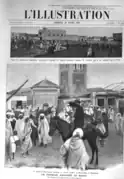


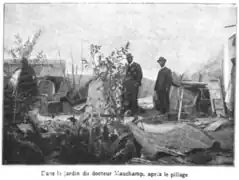
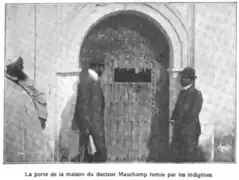
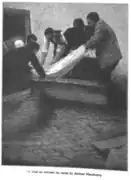
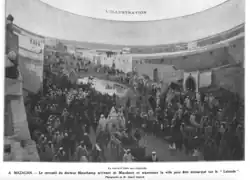
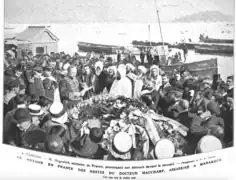
Monuments
A bronze sculpture by Pierre Curillon placed in Chabas Square in the memory of Dr. Émile Mauchamp was inaugurated on August 21, 1910. The statue features a Moroccan woman extending an arm toward the doctor while holding her son in the other arm. German soldiers stole the statue in World War II. A road in Chalon-sur-Saône leading toward the old prison still bears his name.
Bibliography
- "Dr. Pierre Benoit Emile Mauchamp". British Medical Journal. 1 (2413): 785. 1907. doi:10.1136/bmj.1.2413.785-b. PMC 2357128..
- Katz, Jonathan Glustrom (2006). Murder in Marrakech: Émile Mauchamp and the French Colonial Adventure. Bloomington et Indianapolis: Indiana University Press. p. 358. ISBN 978-0-253-34815-9.
- Robert Tatheraux, Émile Mauchamp : la vie généreuse et la fin tragique d'un médecin chalonnais, revue « Images de Saône-et-Loire » n° 56 (Noël 1983), pp. 17–19.
.jpg.webp)
